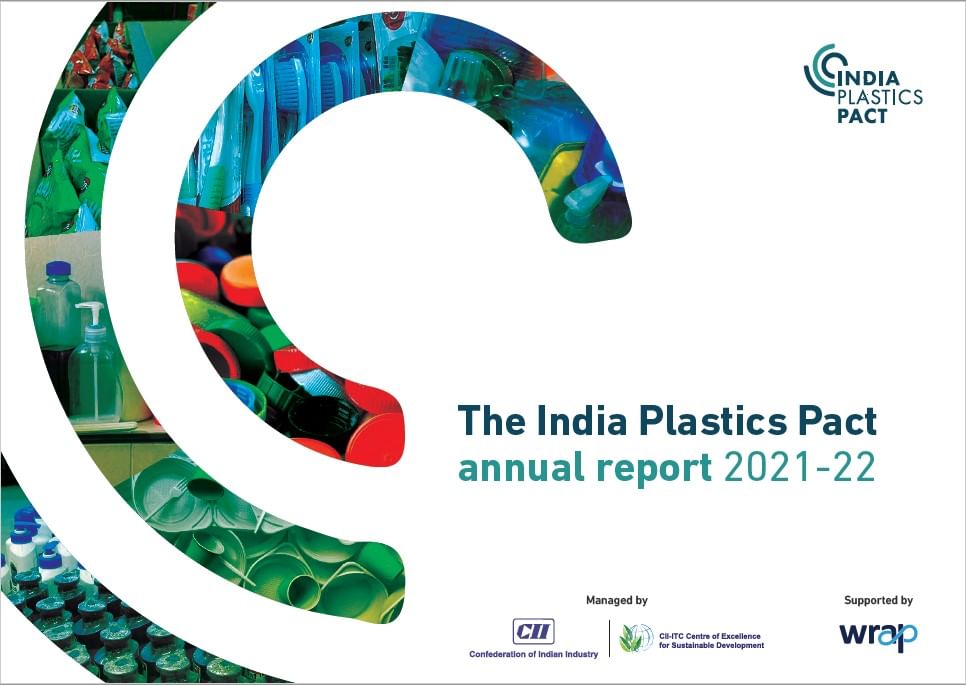The India Plastics Pact launches its first annual report
The annual report 2021-22 of the India Plastics Pact (IPP) was launched on 22 June 2023, provides an overview on the current usage of plastic packaging by the signatories, and their progress towards the targets in 2030. Nandini Kumar shares insights and key points with the WhatPackaging? team
30 Jun 2023 | By Nandini Kumar
Consider this. Collectively, about 5,00,000 tonnes of plastic packaging were placed in the market by Indian Plastic Pact signatories in 2021. Of this, 92% was in the form of primary packaging, and 8% in the form of secondary and tertiary packaging.
It’s this sort of data mapping which made the launch of the India Plastics Pact Annual Report 2021-22 a genuine forum for knowledge sharing. During a hour-long virtual event on 22 June 2023, the speakers shared data about the plastic packaging consumed by signatory’s businesses. The annual data indicates the progress made and if the IPP targets are being met.
Speaking about the data reporting process, Geetanjali Vats, chairperson, India Plastics Pact advisory committee, and global plastic sustainability lead, Asia and ANZ, Hindustan Unilever said, “This is the first time such a report on plastic packaging has been collected and reported under a voluntary initiative across Asia. Data reporting is crucial as it ensures transparency, accountability. Also it shows that this Pact is all about action. The annual reporting process provides us an opportunity to see where the Pact is standing in terms of action.”
The report also provides a view of progress with respect to the four targets: 391 million items classified as problematic or unnecessary were placed on the market by signatories, to be tackled by innovation or designed out of packaging. In terms of design, 64% of plastic packaging placed on the market by the Pact members was recyclable.
The current recycling rate, drawn and calculated from government and other sources, is about 15%, not including plastic waste sent to incinerators, cement kilns or for energy recovery. Only 1% of packaging by weight contains recycled plastic, indicating the need to increase closed-loop recycling. The good news is: packaging formats where it is possible to increase recycled content have been identified with the help of one of Pact's workstreams.

The India Plastics Pact annual report 2021-22
The data will indicate areas for focused work ahead, and some which have been identified are films and flexible packaging and increasing recycled content in plastic packaging. Voluntary projects which bring stakeholders together on a single platform is important from the perspective of managing plastic packaging waste holistically. They can bring awareness about good practice, technology developments and the need to improve design packaging by using, for example, monolayer structures or compatible polymers in a multi-layer packaging format.
The three signatories who showcased their brand and product profile at the launch event were Mondelez, ITC and Marico. Ankit Gupta from ITC showcased the Fiama Showergel product and how ITC has added 50% recycled PET in the bottles of sizes 125-ml, 250-ml and 500-ml. Gupta also shed light on ITC’s Savlon PET soap wrapper which contains 70% recycled plastic. Naveen Damisetty from Mondelez gave insights on Cadbury Dairy Milk Lickables’ spoon which contains 100% rPET. Mobashshir Nasim from Marico shared that Marico is using 10% rPET in the bottles of Nihar Shanti Amla.
In India, a large number of packaging manufacturers are medium and small-scale enterprises who stand to benefit from information and guidance on changes in processes or designs which can have a large impact on recyclability of packaging once it appears in the waste stream.
Other than these benefits, the data points to gaps in the current ecosystem. For example, the low rate of closed-loop recycling indicates the need for high-quality recycling infrastructure to meet EPR targets. A higher market demand for recyclates arising from commitment to targets of the India Plastics Pact and EPR can drive investments into advanced chemical and mechanical recycling. This would lead to upgradation of recycling capacity in general for recyclers in the MSME segment.
The India Plastics Pact, a voluntary business initiative, works with businesses across the plastics value chain towards a transition to a circular economy for plastic packaging in India. The IPP is the first of its kind in Asia and joins a network of 13 other Plastics Pacts across the globe. All 13 Pacts share a common vision of creating a world where plastic is valued and doesn’t pollute the environment. The Confederation of Indian Industry (CII) hosts the India Plastics Pact’s secretariat.
Nandini Kumar is the senior consultant, Confederation of Indian Industry (CII) and lead, India Plastics Pact (IPP).


